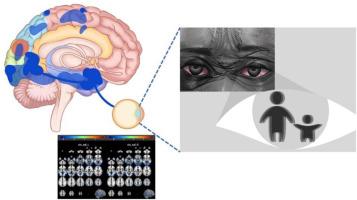The impact of sleep deprivation on the functional connectivity of visual-related brain regions
IF 3.8
2区 医学
Q1 CLINICAL NEUROLOGY
引用次数: 0
Abstract
Background
Sleep deprivation(SD) is known to impair cognitive function and emotional regulation, however, its specific effects on the functional connectivity of visual-related brain regions remain unclear.
Objectives
This study aimed to investigate the impact of 36-h acute sleep deprivation on functional connectivity in visual neural circuits and its relationship with cognitive and emotional changes.
Methods
Sixty healthy male participants were assessed before and after 36 h of sleep deprivation using resting-state fMRI, the Psychomotor Vigilance Task (PVT), the Epworth Sleepiness Scale (ESS), and the Profile of Mood States (POMS). Functional connectivity changes were analyzed using paired t-tests and False Discovery Rate (FDR) correction.
Key results
Sleep deprivation significantly altered functional connectivity between the prefrontal cortex, hippocampus, and visual processing regions. These changes correlated with slower PVT reaction times, increased subjective sleepiness (ESS), and emotional disturbances (POMS), including heightened tension and reduced self-esteem.
Conclusions
The findings suggest that acute sleep deprivation impairs cognitive performance and emotional regulation by changing functional connectivity in key brain regions. These results may strengthen our understanding of neurobiology of SD and its potential negative effects.

求助全文
约1分钟内获得全文
求助全文
来源期刊

Sleep medicine
医学-临床神经学
CiteScore
8.40
自引率
6.20%
发文量
1060
审稿时长
49 days
期刊介绍:
Sleep Medicine aims to be a journal no one involved in clinical sleep medicine can do without.
A journal primarily focussing on the human aspects of sleep, integrating the various disciplines that are involved in sleep medicine: neurology, clinical neurophysiology, internal medicine (particularly pulmonology and cardiology), psychology, psychiatry, sleep technology, pediatrics, neurosurgery, otorhinolaryngology, and dentistry.
The journal publishes the following types of articles: Reviews (also intended as a way to bridge the gap between basic sleep research and clinical relevance); Original Research Articles; Full-length articles; Brief communications; Controversies; Case reports; Letters to the Editor; Journal search and commentaries; Book reviews; Meeting announcements; Listing of relevant organisations plus web sites.
 求助内容:
求助内容: 应助结果提醒方式:
应助结果提醒方式:


